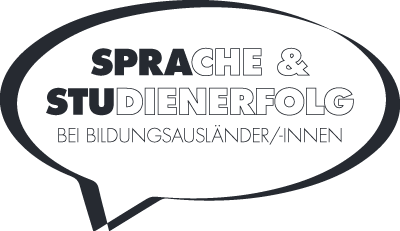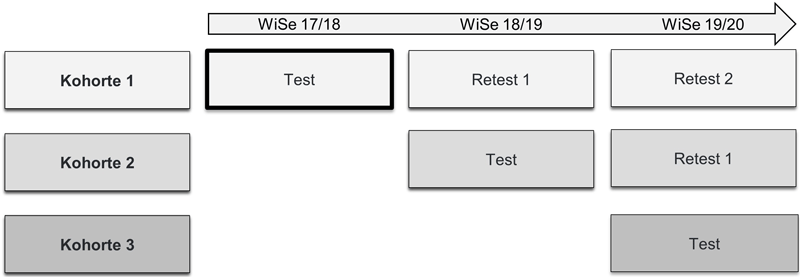Apolinarski, B., & Brandt, T. (2018). Ausländische Studierende in Deutschland 2016: Ergebnisse der Befragung bildungsausländischer Studierender im Rahmen der 21. Sozialerhebung des Deutschen Studentenwerks durchgeführt vom Deutschen Zentrum für Hochschul- und Wissenschaftsforschung. Berlin: Bundesministerium für Bildung und Forschung. Retrieved from http://www.sozialerhebung.de/download/21/soz_21_ba-bericht-dt.pdf
Bärenfänger, O., Lange, D., & Möhring, J. (2015). Sprache und Bildungserfolg: Sprachliche Anforderungen in der Studieneingangsphase. Research papers in assessment: Vol. 1. Leipzig: Institut für Testforschung und Testentwicklung. Retrieved from http://nbn-resolving.de/urn:nbn:de:bsz:15-qucosa-188820
BMBF (Ed.). (2013). Ausländische Studierende in Deutschland 2012: Ergebnisse der 20. Sozialerhebung des Deutschen Studentenwerks durchgeführt vom Deutschen Zentrum für Hochschul- und Wissenschaftsforschung (DZHW). Berlin. Retrieved from http://www.sozialerhebung.de/download/20/soz20_auslaenderbericht.pdf
DAAD/DZHW (2019). Wissenschaft weltoffen 2019. Daten und Fakten zur Internationalität von Studium und Forschung in Deutschland. Fokus: Studienland Deutschland- Motive und Erfahrungen internationaler Studierender. Bielefeld: DAAD/DZHW. Verfügbar unter http://www.wissenschaftweltoffen.de/publikation
Ehlich, K. (1995). Die Lehre der deutschen Wissenschaftssprache: sprachliche Strukturen, didaktische Desiderate. In H. L. Kretzenbacher & H. Weinrich (Eds.), Linguistik der Wissenschaftssprache (pp. 325–351). Berlin: Walter de Gruyter.
Ehlich, K. (1999). Alltägliche Wissenschaftssprache. Informationen Deutsch Als Fremdsprache, 26(1), 3–24.
Europarat (Ed.). (2001). Gemeinsamer europäischer Referenzrahmen für Sprachen (J. Quetz, Trans.). Berlin: Langenscheidt.
Heublein, U. (2015). Von den Schwierigkeiten des Ankommens: Überlegungen zur Studiensituation ausländischer Studierender an den deutschen Hochschulen. Die Neue Hochschule, 2015(1), 14–17.
Heublein, U., Ebert, J., Hutzsch, C., Isleib, S., König, R., Richter, J., & Woisch, A. (2017). Zwischen Studienerwartungen und Studienwirklichkeit: Ursachen des Studienabbruchs, beruflicher Verbleib der Studienabbrecherinnen und Studienabbrecher und Entwicklung der Studienabbruchquote an deutschen Hochschulen. Forum Hochschule: Vol. 2017/1. Hannover: Deutsches Zentrum für Hochschul- und Wissenschaftsforschung.
Heublein, U., Hutzsch, C., Schreiber, J., Sommer, D., & Besuch, G. (2010). Ursachen des Studienabbruchs in Bachelor- und in herkömmlichen Studiengängen: Ergebnisse einer bundesweiten Befragung von Exmatrikulierten des Studienjahres 2007/08. HIS: Forum Hochschule: Vol. 2010/2. Hannover: HIS-Hochschul-Informations-System. Retrieved from http://www.dzhw.eu/pdf/pub_fh/fh-201002.pdf
Heublein, U. & Schmelzer, R. (2018). Die Entwicklung der Studienabbruchquoten an den deutschen Hochschulen. Statistische Berechnungen auf Basis des Absolventenjahrgangs 2016. Hannover: DZHW.
Heublein, U., & Wank, J. (2011). Bildungsinländer 2011: Daten und Fakten zur Situation von ausländischen Studierenden mit deutscher Hochschulzugangsberechtigung. Bonn: Deutscher Akademischer Austauschdienst.
Hirschmann, H., & Nolda, A. (2019). Dulko – auf dem Weg zu einem deutsch-ungarischen Lernerkorpus. In L. Eichinger, L. M., & Plewnia, A. (Eds.), Jahrbuch des Instituts für Deutsche Sprache: Vol. 2018. Neues vom heutigen Deutsch: Empirisch – methodisch – theoretisch (1st ed., pp. 339–342). Berlin: Walter de Gruyter. https://doi.org/10.1515/9783110622591-019
Lou, N. M., & Noels, K. A. (2017). Measuring Language Mindsets and Modeling Their Relations With Goal Orientations and Emotional and Behavioral Responses in Failure Situations. The Modern Language Journal, 101(1), 214–243. https://doi.org/10.1111/modl.12380
MacIntyre, P. D., Baker, S. C., Clément, R., & Conrod, S. (2001). Willingness to Communicate, Social Support, and Language-Learning Orientations of Immersion Students. Studies in Second Language Acquisition, 23(3), 369–388. https://doi.org/10.1017/S0272263101003035
Marks, D. (2015). Prüfen sprachlicher Kompetenzen internationaler Studienanfänger an deutschen Hochschulen – Was leistet der TestDaF? Zeitschrift Für Interkulturellen Fremdsprachenunterricht, 20(1), 21–39. Retrieved from https://tujournals.ulb.tu-darmstadt.de/index.php/zif/article/download/189/182
McManus, K., Mitchell, R., & Tracy-Ventura, N. (2014). Understanding insertion and integration in a study abroad context: The case of English-speaking sojourners in France. Revue Française De Linguistique Appliquée, 19(2), 97–116. Retrieved from https://www.cairn.info/revue-francaise-de-linguistique-appliquee-2014-2-page-97.htm#
Morris-Lange, S. (2017). Allein durch den Hochschuldschungel: Hürden zum Studienerfolg für internationale Studierende und Studierende mit Migrationshintergrund (Studie des SVR-Forschungsbereichs 2017-2). Berlin: Forschungsbereich beim Sachverständigenrat deutscher Stiftungen für Integration und Migration (SVR). Retrieved from https://www.svr-migration.de/publikationen/hochschuldschungel
Mystkowska-Wiertelak, A., & Pawlak, M. (2017). Willingness to Communicate in Instructed Second Language Acquisition: Combining a Macro- and Micro-Perspective. Bristol: Multilingual Matters.
Neuenhaus, N., Artelt, C., & Schneider, W. (2017). Lernstrategiewissen im Bereich Englisch: Entwicklung und erste Validierung eines Tests für Schülerinnen und Schüler der frühen Sekundarstufe. Diagnostica, 63(2), 135–147. https://doi.org/10.1026/0012-1924/a000171
Nolda, A. (2019). Annotation von Lernerdaten mit EXMARaLDA (Dulko). Manuscript, Berlin: Berlin-Brandenburgische Akademie der Wissenschaften. Retrieved from https://andreas.nolda.org/publications/nolda_2019_annotation_lernerdaten.pdf
NSSE (2015). National Survey of Student Engagement: The College Student Report [Paper-formatted facsimile of a survey instrument]. Retrieved from http://nsse.indiana.edu/html/survey_instruments.cfm?siFlag=yes&sy=2015
Rech, J. (2012). Studienerfolg ausländischer Studierender: Eine empirische Analyse im Kontext der Internationalisierung der deutschen Hochschulen. Internationale Hochschulschriften: Vol. 577. Münster: Waxmann.
Rehbein, J., Schmidt, T., Meyer, B., Watzke, F., & Herkenrath, A. (2004). Handbuch für das computergestützte Transkribieren nach HIAT: Version 1.0. Arbeiten zur Mehrsprachigkeit Folge B: Vol. 56. Hamburg: Sonderforschungsbereich 538 Mehrsprachigkeit, Universität Hamburg. Retrieved from https://ids-pub.bsz-bw.de/frontdoor/deliver/index/docId/2368/file/Schmidt_Handbuch+f%C3%BCr+das+computergest%C3%BCtzte+Transkribieren_2004.pdf
Swales, J. (1996). Occluded Genres in the Academy: The Case of the Submission Letter. In Ventola, E., & Mauranen, A. (Eds.), Academic writing: Intercultural and textual issues. Pragmatics & beyond: New series: Vol. 41. (pp. 45–58). Amsterdam: John Benjamins Pub.
Wild, K.-P. (2000). Lernstrategien im Studium: Strukturen und Bedingungen. Pädagogische Psychologie und Entwicklungspsychologie: Vol. 16. Münster: Waxmann.
Wirth, J., & Leutner, D. (2008). Self-Regulated Learning as a Competence: Implications of Theoretical Models for Assessment Methods. Journal of Psychology, 216(2), 102–110. https://doi.org/10.1027/0044-3409.216.2.102
Wisniewski, K. (2019). Mitschreiben in Vorlesungen. Ein interdisziplinärer Forschungsüberblick mit Fokus Deutsch als L2. In C. Fandrych & R. Schmidlin (Eds.), Bulletin suisse de linguistique appliquée: Vol. 109. Wissenschaftssprache(n) kontrastiv. 153-170.
Wisniewski, K., Parker, M., Lenhard, W., & Seeger, J. (2019). Sprachbezogenes metakognitives Strategiewissen im Studienalltag internationaler Studierender: Der szenariobasierte Fragebogen ScenEx. Zeitschrift Für Fremdsprachenforschung, 30(1), 55-76.
York, T. T., Gibson, C., & Rankin, S. (2015). Defining and Measuring Academic Success. Practical Assessment, Research & Evaluation, 20(5). Retrieved from https://pareonline.net/getvn.asp?v=20&n=5





